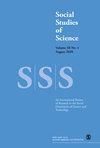Scientific-intellectual movements in the post-truth age: The case of the Extended Evolutionary Synthesis
IF 2.7
2区 社会学
Q1 HISTORY & PHILOSOPHY OF SCIENCE
引用次数: 0
Abstract
Over the past decade, evolutionary biology has seen an unusual number of heated debates centered around the pronouncement of an Extended Evolutionary Synthesis (EES). This theoretical framework brings together researchers from a range of disciplines in biology, such as ecology, developmental biology, and epigenetics, as well as philosophers of science, to challenge some of the key tenets of contemporary evolutionary theory, by arguing for a greater role of the environment and the organism in evolution. In this article, we analyze the EES as a scientific-intellectual movement (SIM) that has emerged under two specific conditions. First, evolutionary biology has always been both scientifically and socially influential and contested. As a field that claims to answer fundamental questions of how life has come to be, evolutionary biology has shaped causal thinking in fields as diverse as biology, psychology, and economics, and has influenced cultural thought and politics. Second, this specific contestation of mainstream evolutionary thinking emerges in the midst of challenges to particular sciences by what are seen as ‘post-truth’ and ‘anti-science’ movements. Drawing on interviews, participant observation, and document analysis, we examine the credibility strategies that EES proponents employ under these conditions, highlighting what happens when opponents of the EES make use of the ‘post-truth’ label to argue against the EES. We argue that this transposition of structures familiar from public and political debate onto contestations within science represents an important topic of study for STS researchers in the current political moment.后真理时代的科学知识运动:扩展进化综合论的案例
在过去的十年里,进化生物学已经看到了围绕扩展进化合成(EES)的声明的不同寻常的激烈辩论。这个理论框架汇集了来自生物学各个学科的研究人员,如生态学、发育生物学和表观遗传学,以及科学哲学家,通过主张环境和有机体在进化中发挥更大的作用,来挑战当代进化论的一些关键原则。在本文中,我们分析了EES作为一种科学知识运动(SIM)是在两种特定条件下产生的。首先,进化生物学在科学上和社会上一直具有影响力和争议。作为一个声称能回答生命是如何形成的基本问题的领域,进化生物学在生物学、心理学和经济学等不同领域塑造了因果思维,并影响了文化思想和政治。其次,这种对主流进化思想的特定争论出现在被视为“后真理”和“反科学”运动对特定科学的挑战中。通过访谈、参与者观察和文献分析,我们研究了EES支持者在这些条件下采用的可信度策略,强调了当EES的反对者利用“后真相”标签来反对EES时发生的事情。我们认为,在当前的政治时刻,这种从公共和政治辩论到科学争论的熟悉结构的转换代表了STS研究人员的一个重要研究课题。
本文章由计算机程序翻译,如有差异,请以英文原文为准。
求助全文
约1分钟内获得全文
求助全文
来源期刊

Social Studies of Science
管理科学-科学史与科学哲学
CiteScore
5.70
自引率
6.70%
发文量
45
审稿时长
>12 weeks
期刊介绍:
Social Studies of Science is an international peer reviewed journal that encourages submissions of original research on science, technology and medicine. The journal is multidisciplinary, publishing work from a range of fields including: political science, sociology, economics, history, philosophy, psychology social anthropology, legal and educational disciplines. This journal is a member of the Committee on Publication Ethics (COPE)
 求助内容:
求助内容: 应助结果提醒方式:
应助结果提醒方式:


